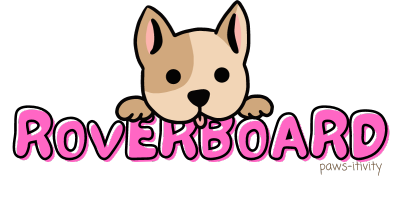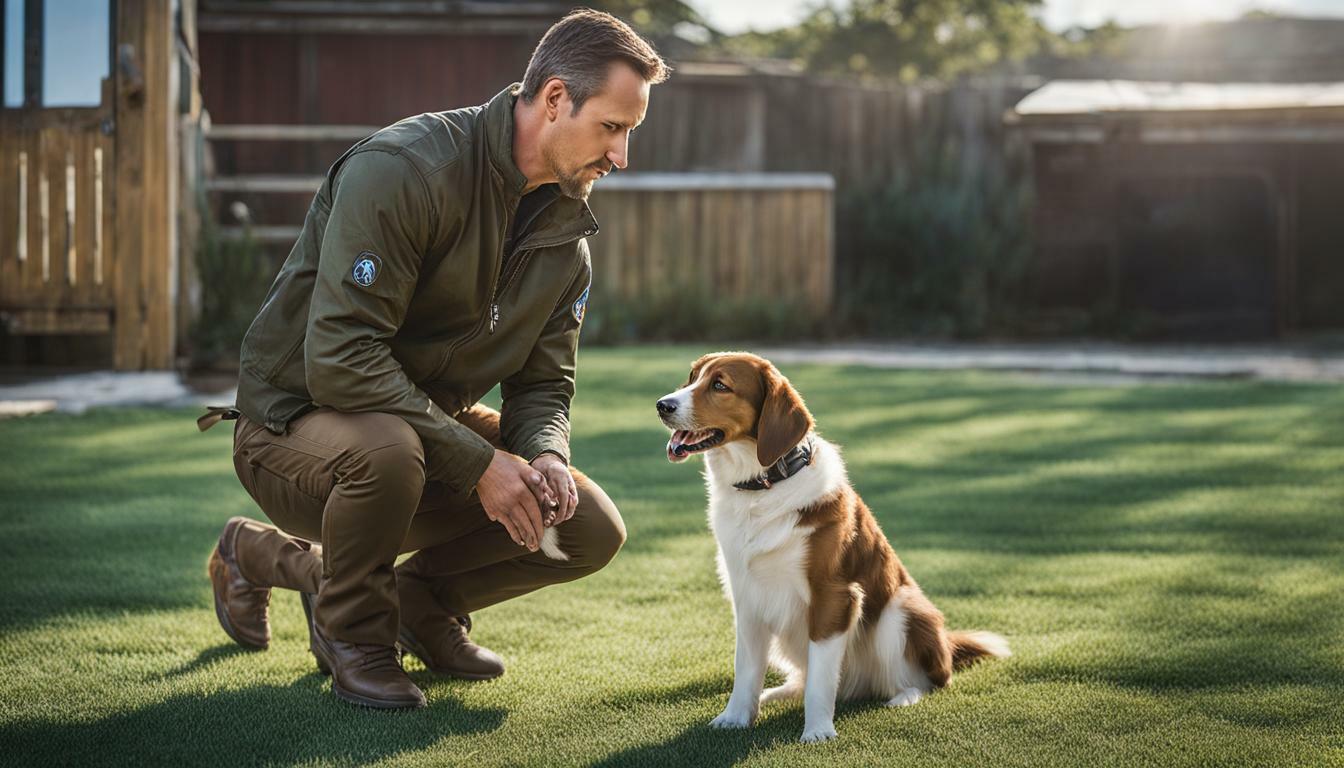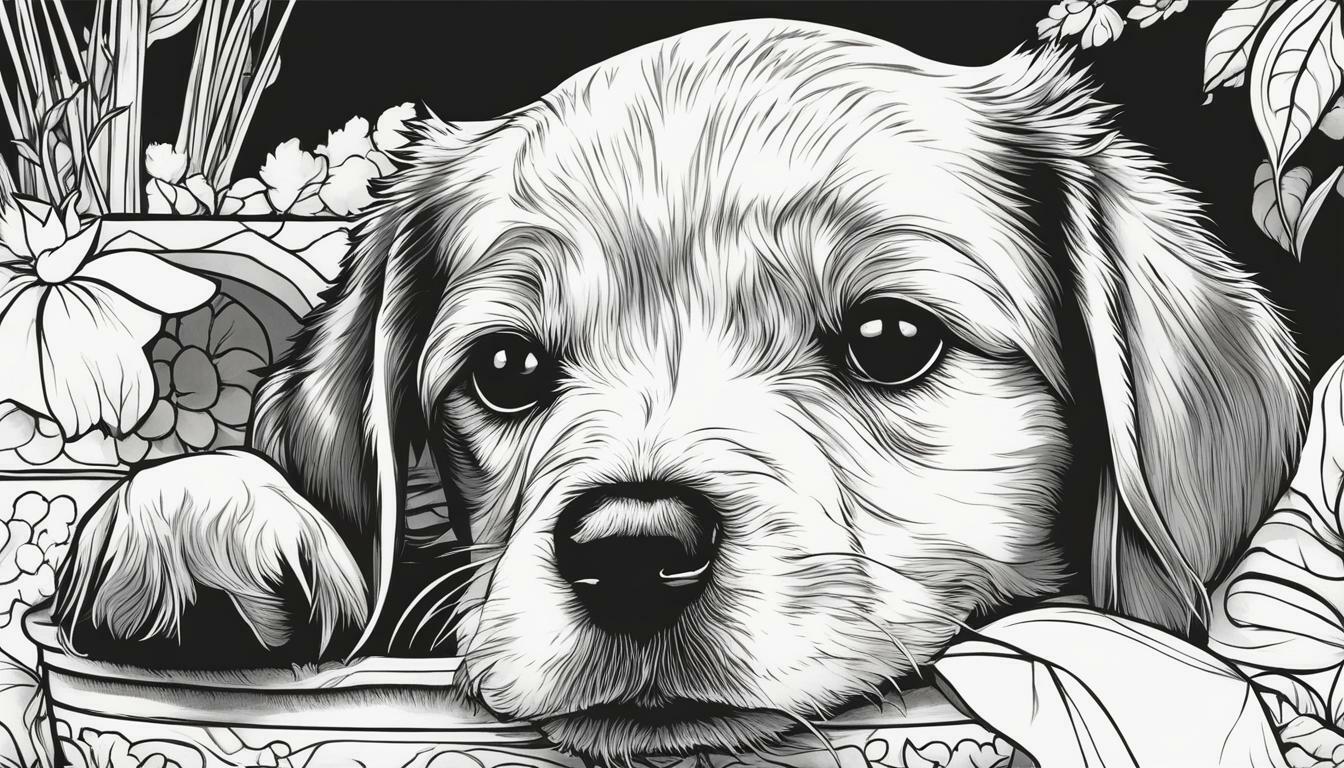Welcome to your ultimate resource for everything Yorkshire Terrier! In this comprehensive Yorkshire Terrier ownership guide, we will cover everything you need to know about owning and caring for this lively breed. From their unique breed characteristics to their health needs, grooming requirements, training techniques, and much more, this guide will provide all the information you need to ensure a happy and healthy life for your furry friend.
- Learn about the specific breed characteristics of Yorkshire Terriers before bringing one into your home.
- Proper Yorkshire Terrier care includes attention to grooming, diet, exercise, and health needs.
- Effective training techniques will help address behavioral issues and foster a positive relationship with your Yorkshire Terrier.
- Socializing your Yorkshire Terrier with other dogs and people is essential for their well-being and development.
- Ensure your Yorkshire Terrier’s overall health and wellness through preventive measures and early detection strategies.
Understanding the Yorkshire Terrier Breed
Before bringing a Yorkshire Terrier into your home, it’s important to familiarize yourself with their breed characteristics. Learn about their size, temperament, coat type, and general health considerations to ensure a good match between your lifestyle and the needs of a Yorkshire Terrier.
The Yorkshire Terrier, also known as the “Yorkie,” originated in England during the 19th century. They were originally bred for catching rats in textile mills and mines, but soon became popular companion dogs due to their small size and affectionate nature.
| Size | Temperament | Coat Type |
|---|---|---|
| Yorkshire Terriers are small dogs, typically weighing between 4-7 pounds and standing around 7-8 inches tall. | Yorkies are known for their lively and affectionate personalities. They love to be near their owners and thrive on attention and affection. | Yorkies have a distinctive blue and tan coat that is long, silky, and straight. Regular grooming is necessary to maintain their beautiful coat. |
Despite their small size, Yorkshire Terriers are known for their big personalities. They are curious, playful, and love to explore. However, they can also be stubborn and may require patience during training.
It’s important to note that Yorkshire Terriers are prone to certain health issues, such as dental problems, collapsed trachea, and hypoglycemia. Regular veterinary check-ups and proper care can help prevent or detect these issues early on.
Overall, Yorkshire Terriers make wonderful companions for those willing to provide them with the love and care they require.
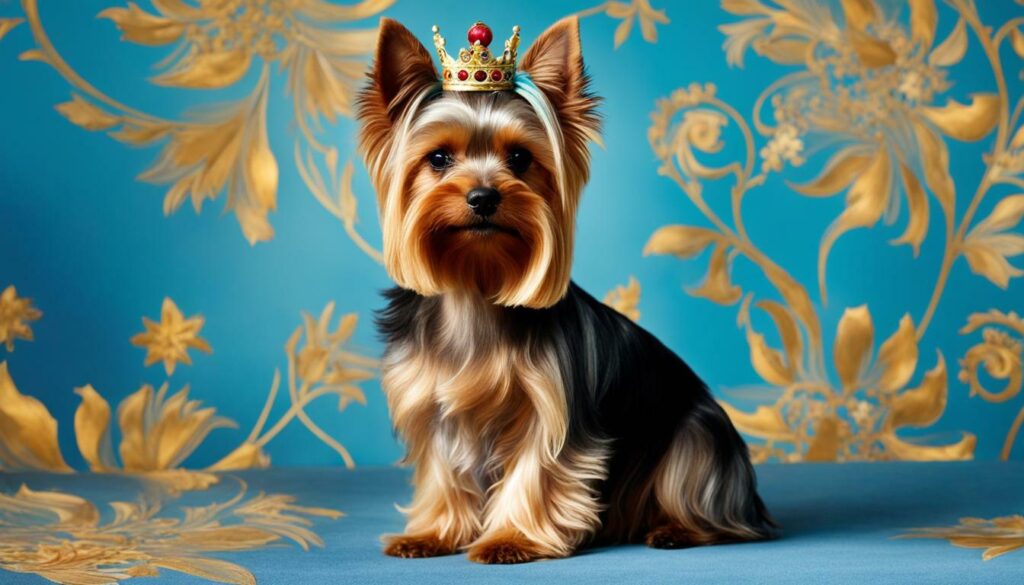
If you’re a proud owner of a Yorkshire Terrier or planning to become one, it’s important to know how to care for your furry friend properly. Here are some Yorkshire Terrier care tips to help you keep your pet healthy and happy:
Health Tips
Yorkshire Terriers are generally healthy, but like any other breed, they are prone to specific health issues. Regular vet visits, checkups, and preventive care can go a long way in keeping your Yorkshire Terrier in top shape.
Some of the common health issues with Yorkshire Terriers include dental problems, luxating patellas, and hypoglycemia. Regular teeth brushing and dental checkups can prevent dental issues. Keeping your Yorkshire Terrier at a healthy weight can help prevent luxating patellas. Hypoglycemia can be prevented by ensuring that your Yorkshire Terrier eats regularly and doesn’t exert themselves excessively.
Grooming Guide
Yorkshire Terriers have a long, silky coat that requires regular grooming to keep it in top condition. Brushing their coat at least once a day can help prevent matting and tangling. Bathing should be done every month and a half, or when necessary. Trimming their hair is also essential to keep them looking their best.
It’s important to make sure to properly dry your Yorkshire Terrier’s coat after bathing or swimming to prevent skin irritation. Additionally, regular ear cleaning and nail trimming are important grooming practices to prevent infections and overgrown nails that can cause discomfort and pain.
Diet Recommendations
Yorkshire Terriers have small stomachs and require a specialized diet that meets their nutritional needs. Feed your Yorkshire Terrier high-quality dry food that contains high-quality protein and moderate fat. Avoid feeding your Yorkshire Terrier table scraps, as it can cause digestive issues and lead to obesity.
Feed your Yorkshire Terrier small frequent meals throughout the day to avoid hypoglycemia. Provide fresh water throughout the day to keep your pet well-hydrated.
Exercise Needs
Despite their small size, Yorkshire Terriers are energetic dogs and require regular exercise to maintain their health and energy levels. Daily walks, indoor playtime, and mental stimulation activities can help keep them happy and healthy.
Yorkshire Terriers are also prone to obesity, so it’s essential to ensure that they maintain a healthy weight through regular exercise.
By following these Yorkshire Terrier care tips, you can ensure that your furry friend stays in optimal condition and lives a happy and healthy life.

Yorkshire Terriers are intelligent dogs that are eager to please their owners. This makes them highly trainable, but it’s important to approach their training with patience and consistency. Yorkshire Terriers can sometimes be stubborn, so it’s important to establish yourself as the pack leader from the start.
Basic Training Commands
Teaching basic commands to your Yorkshire Terrier is an essential step in their training. Some of the basic commands include sit, stay, come, and heel. Start with one command at a time and be sure to use positive reinforcement techniques, such as treats and praise, to encourage your Yorkshire Terrier to obey.
It’s essential to keep training structured and consistent, with short and frequent training sessions. Yorkshire Terrier has short attention spans, so it’s crucial to keep training sessions brief and to the point.
Addressing Behavioral Issues
Yorkshire Terriers can sometimes exhibit behavioral issues, such as excessive barking, digging, and separation anxiety. These problems can be addressed with proper training techniques and positive reinforcement. Consistent training and behavior modification techniques can help your Yorkshire Terrier overcome these problems and become a well-behaved companion.
It’s important to understand that punishing your Yorkshire Terrier for bad behavior is not an effective training method. Instead, use positive reinforcement techniques to encourage good behavior and discourage bad behavior. This can include offers of treats, verbal praise, and toys as rewards for good behavior.
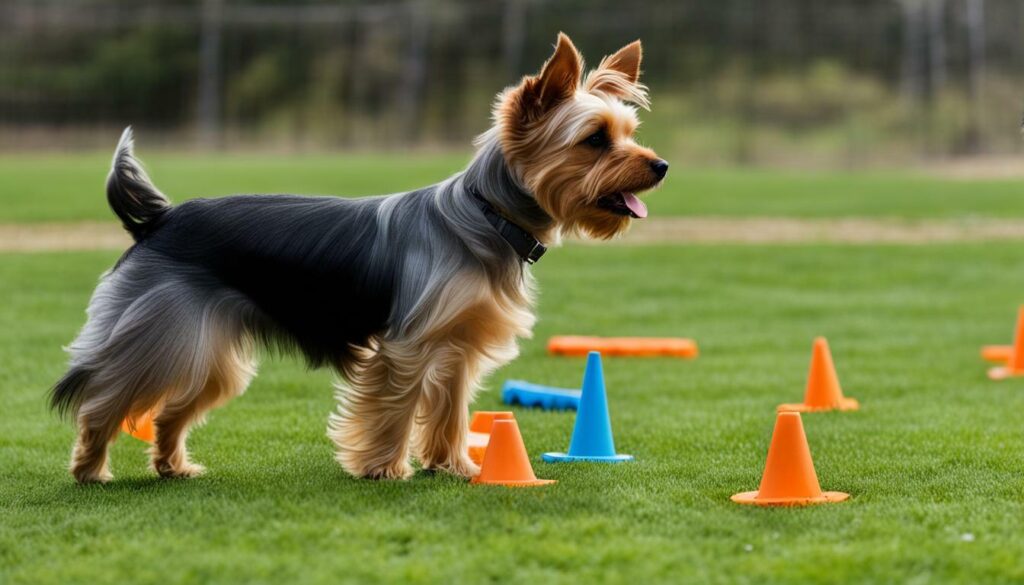
Socialization is crucial for your Yorkshire Terrier’s overall behavior and well-being. Introduce your Yorkshire Terrier to different people, pets, and situations from a young age to help them become confident and well-adjusted. This can include puppy classes, playdates with other dogs, and outings to public places.
If you adopt an older Yorkshire Terrier, socialization is still important and should be done gradually and with patience. Be sure to reward your Yorkshire Terrier’s good behavior during socialization training.
By using positive reinforcement techniques and consistent training methods, you can mold your Yorkshire Terrier into a well-behaved and obedient companion. Remember to take things slow, keep sessions brief and to the point, and always use positive reinforcement. With time and patience, your Yorkshire Terrier will become a well-adjusted and happy pet.
Socializing Your Yorkshire Terrier
Socializing your Yorkshire Terrier is crucial to ensure that they develop good behavior and adaptability. It is important to expose your dog to different people, animals, and environments from a young age. This will help your Yorkshire Terrier to feel more comfortable and confident in various situations.
One way to socialize your Yorkshire Terrier is by taking them on daily walks. This will allow your dog to encounter new sights, smells, and sounds. As you walk, encourage your dog to interact with other dogs and their owners.
Additionally, attending training classes and dog parks can be beneficial for your Yorkshire Terrier’s socialization. These environments allow your dog to interact with other dogs and learn appropriate behaviors.
When introducing your Yorkshire Terrier to new people, it is important to do so slowly and calmly. Encourage your dog to approach the person on their own terms, and reward them for good behavior.
Lastly, it is important to be patient with your Yorkshire Terrier’s socialization process. Every dog is different, and some may take longer to feel comfortable in new situations. By providing positive reinforcement and a safe environment, your Yorkshire Terrier will develop into a well-rounded and confident pet.
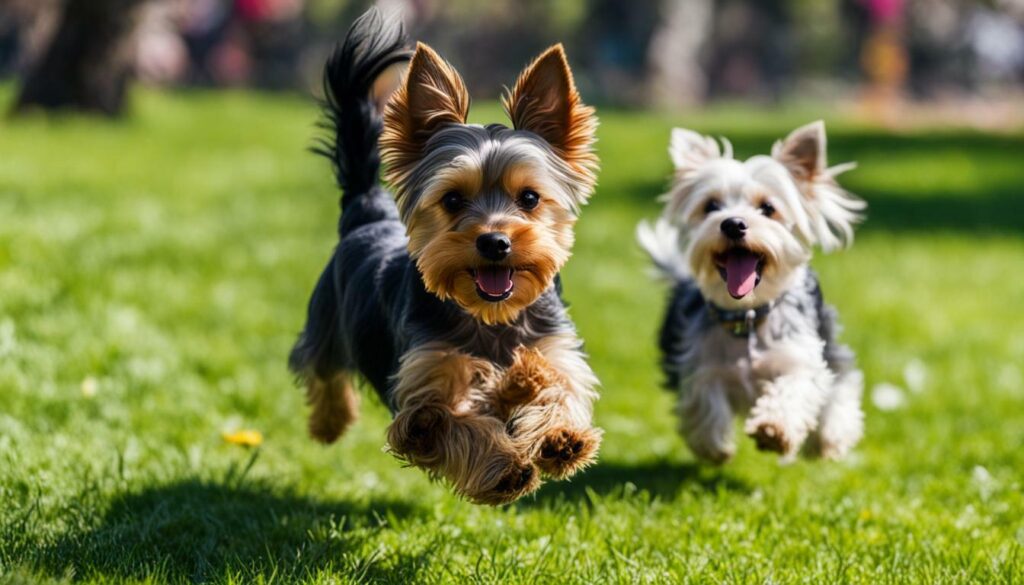
As with any breed, Yorkshire Terriers are prone to certain health issues and require regular care to maintain their overall well-being. Here are some important health tips for your Yorkshire Terrier:
Regular Check-Ups
It’s important to schedule regular check-ups with your veterinarian to detect any potential health issues early on. Your vet may recommend specific vaccinations, parasite prevention, dental cleanings, and bloodwork to monitor your Yorkshire Terrier’s health.
Proper Nutrition
A healthy diet is essential for your Yorkshire Terrier’s health and longevity. Choose high-quality dog food that meets their nutritional needs and is appropriate for their age, size, and activity level. Avoid feeding them table scraps or human food, which can lead to obesity and digestive issues.
SEO tip: Yorkshire Terrier health tips are crucial for the well-being of your pet. Ensure you follow proper nutrition guidelines and schedule regular check-ups with your vet.
Exercise Needs
Yorkshire Terriers require regular exercise to maintain their physical and mental health. Daily walks, indoor playtime, and interactive toys can provide the necessary exercise and mental stimulation. However, be careful not to over-exercise your Yorkshire Terrier, as they are prone to joint problems and can suffer from heat exhaustion.
Common Health Issues
Yorkshire Terriers are prone to certain health issues, including dental problems, skin allergies, hypoglycemia, collapsed trachea, and luxating patella. Monitor your Yorkshire Terrier for any signs of these illnesses, such as bad breath, itching, coughing, limping, or lethargy. Early detection can prevent further complications.

By following these health tips and providing regular care, you can help ensure a happy and healthy life for your beloved Yorkshire Terrier.
Yorkshire Terrier Grooming Guide
Yorkshire Terriers have a beautiful, long, silky coat that requires regular grooming to keep it healthy and shiny. Proper grooming not only enhances their physical appearance but also prevents matting, skin irritations, and infections. Here are some essential Yorkshire Terrier grooming tips:
Brushing
Yorkshire Terriers require daily brushing to maintain their long, flowing coat. Use a soft-bristled brush or comb to detangle any knots or mats gently. Start brushing at the ends of their fur and work your way up to the roots. Avoid pulling or tugging at their hair to prevent hurting them. Regular brushing also helps distribute their coat’s natural oils, keeping it healthy and shiny.
Bathing
Bathing your Yorkshire Terrier once a month is sufficient to keep them clean and smelling fresh. Use a mild shampoo suited to their coat type and length and avoid getting water in their ears. Rinse thoroughly to prevent any residue left behind, which can cause skin irritation. Dry them with a towel or hair dryer on low heat, carefully avoiding their face and ears.
Maintaining their Hairstyle
Yorkshire Terriers are known for their distinctive long hair on their head, back, and legs. To maintain their signature look, trim their hair regularly to the desired length using shears or clippers. Alternatively, you can take them to a professional groomer every few months for a full haircut. Remember to trim their nails and clean their ears regularly to avoid any infections.
Cleaning Teeth and Ears
Yorkshire Terriers are susceptible to dental problems, so it’s crucial to clean their teeth regularly. Use a soft-bristled toothbrush and toothpaste designed explicitly for dogs to avoid any harm to their teeth or gums. Clean their ears weekly with a cotton ball and a vet-approved ear cleaning solution, gently wiping away any dirt or debris.

Grooming your Yorkshire Terrier can be a fun bonding experience, and regular grooming will keep your pet healthy and comfortable. With proper grooming and care, your Yorkshire Terrier will be the envy of all the other dogs on the block!
Feeding Your Yorkshire Terrier
Proper nutrition is essential to keep your Yorkshire Terrier healthy, happy, and full of energy. As small dogs, Yorkshire Terriers have specific dietary requirements that differ from larger breeds. As a responsible owner, it’s crucial to understand and meet your Yorkshire Terrier’s dietary needs.
Yorkshire Terrier Diet Recommendations
| Food Type | Recommended Amount |
|---|---|
| Dry Kibble | 1/4 to 1/2 cup per day, divided into two meals |
| Wet Food | 1/4 to 1/2 cup per day, divided into two meals |
| Treats | Limit to 10% of daily food intake |
A nutritious diet for Yorkshire Terriers should consist of high-quality protein, carbohydrates, and fats. Essential vitamins and minerals should also be included in their diet to aid in their growth and development. Consider consulting with a veterinarian to determine the best diet plan for your Yorkshire Terrier based on their age, weight, and activity level.

It’s important to monitor your Yorkshire Terrier’s weight and adjust their food intake accordingly. Overfeeding can lead to obesity and associated health problems, such as joint pain, heart disease, and diabetes.
Ensure your Yorkshire Terrier has access to clean, fresh water at all times. Dehydration can cause serious health issues, so a bowl of water should be available to them throughout the day.
By following these Yorkshire Terrier diet recommendations, you can ensure your pet is receiving the proper nutrition to maintain a healthy and active lifestyle.
Meeting Yorkshire Terrier Exercise Needs
Yorkshire Terriers are active and energetic dogs that require regular exercise to maintain their physical and mental health. As a small breed, they do not need extensive exercise, but it is important to provide them with enough physical activity to prevent obesity and boredom.
The recommended daily exercise for a Yorkshire Terrier is at least 30 minutes of brisk walk or indoor playtime. You can also incorporate mental stimulation activities to keep your dog engaged and stimulated. Examples include hide-and-seek, puzzle toys, and agility training.
When walking your Yorkshire Terrier, ensure that they are on a leash, as they have a high prey drive and may chase after small animals. Choose a well-fitted harness that is comfortable and does not place any strain on their neck or throat. Avoid walking them during extreme weather conditions, as they are sensitive to heat and cold.
| Indoor Exercise Ideas | Outdoor Exercise Ideas |
|---|---|
|
|
It’s important to keep your Yorkshire Terrier’s exercise routine consistent and vary the activities to prevent boredom. Lack of exercise can lead to destructive behavior, obesity, and various health issues.
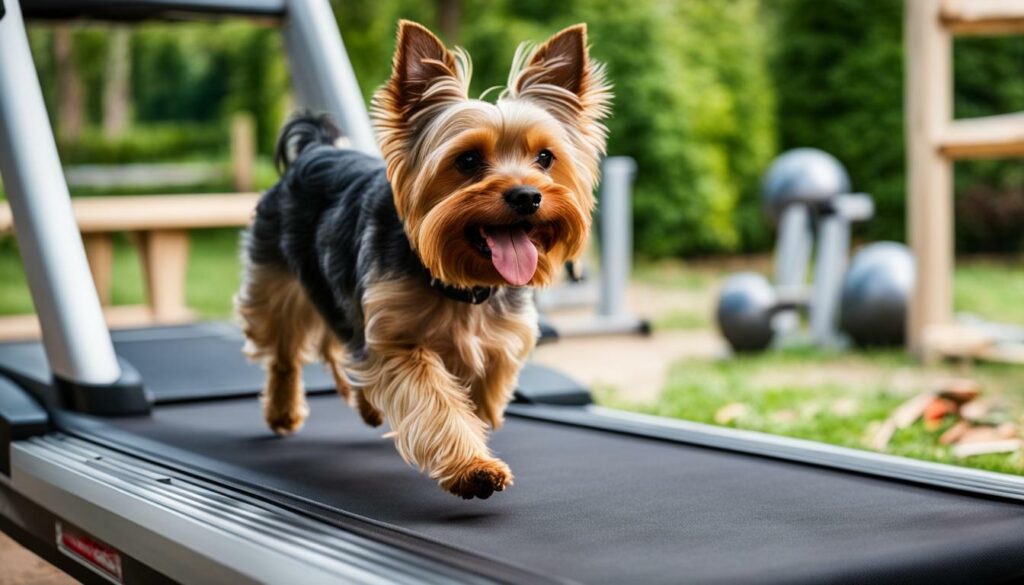
Remember to consult with your veterinarian before starting any new exercise routines, especially if your Yorkshire Terrier has any underlying health conditions. Always monitor their behavior during exercise and adjust the routines accordingly if needed.
Maintaining Yorkshire Terrier Behavior
Yorkshire Terriers are known for their feisty and energetic personalities. However, like any other breed, they may exhibit behaviors that require attention and modification. It’s important to understand your Yorkshire Terrier’s behavior and address any issues to ensure a happy and harmonious living environment.
Separation Anxiety
Yorkshire Terriers are prone to separation anxiety, which can result in destructive behavior and excessive barking. To prevent separation anxiety, gradually acclimate your Yorkshire Terrier to being alone by leaving them alone for short periods before extending the time. Provide them with toys and treats to keep them occupied and create a comfortable space with their bed and familiar items.
Excessive Barking
Yorkshire Terriers are naturally vocal and may bark excessively, which can lead to neighbor complaints and other issues. To address excessive barking, provide your Yorkshire Terrier with enough exercise and mental stimulation, as boredom can cause excess barking. Additionally, train your Yorkshire Terrier to understand the “Quiet” command and reward them for being quiet.
Territorial Behavior
Yorkshire Terriers can be territorial, which can result in aggression towards other dogs or humans. To prevent territorial behavior, socialize your Yorkshire Terrier from an early age. Expose them to different people and environments and reward them for good behavior. Additionally, avoid encouraging aggressive behavior by not playing rough or allowing them to guard their food or toys.
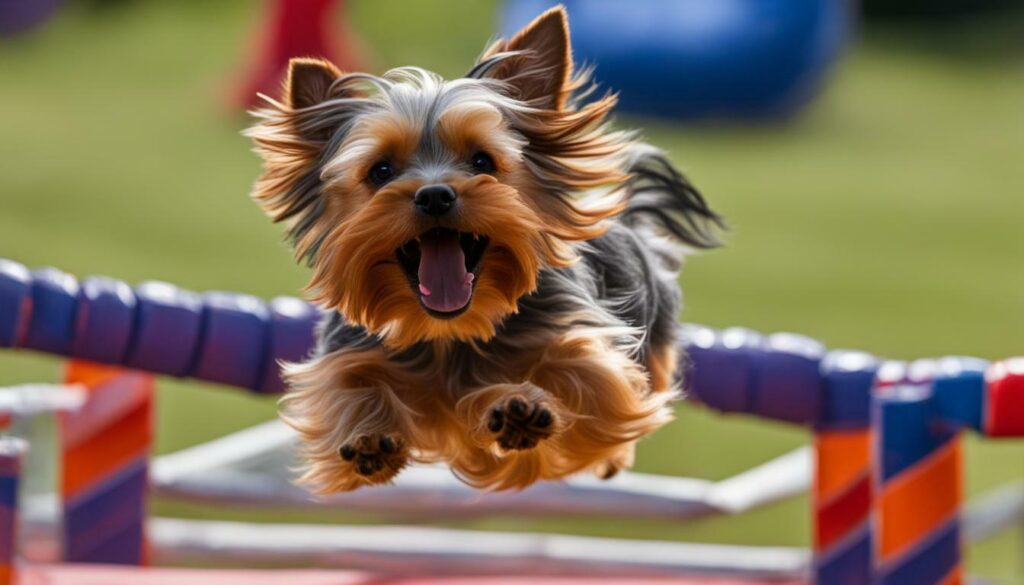
By understanding and addressing your Yorkshire Terrier’s behavior, you can create a happy and balanced living environment for both you and your pet. Remember to reward good behavior and be patient during training and modification. With consistent effort, you can help your Yorkshire Terrier become a well-behaved and loving companion.
Conclusion
We hope this comprehensive Yorkshire Terrier ownership guide has provided you with valuable insights and tips on caring for your furry companion. By understanding their unique breed characteristics, providing the right care and training, socializing them, and addressing their specific health concerns, you can ensure a happy and healthy life for your Yorkshire Terrier.
Remember to groom your Yorkshire Terrier regularly to maintain their beautiful coat, feed them a balanced diet, and provide regular exercise to keep them active and healthy. Address any behavioral issues by using positive reinforcement and training techniques, and seek veterinary care if any health concerns arise.
With the information and resources provided in this guide, you are now well-equipped to provide the best care and a loving home for your Yorkshire Terrier. Enjoy the journey of being a Yorkshire Terrier owner and cherish the special bond you will form with your furry companion!
FAQ
Q: What are some key characteristics of Yorkshire Terriers?
A: Yorkshire Terriers are small in size, have a lively temperament, and possess a long and silky coat. They are known for their loyalty and affectionate nature.
Q: How often should I groom my Yorkshire Terrier?
A: Yorkshire Terriers require regular grooming to maintain the health and appearance of their coat. Aim for grooming sessions every 4-6 weeks to keep their coat free from tangles and mats.
Q: What should I feed my Yorkshire Terrier?
A: Yorkshire Terriers should be fed high-quality dog food that is specifically formulated for small breeds. Consult with your veterinarian for recommendations on portion sizes and feeding schedules.
Q: How much exercise do Yorkshire Terriers need?
A: Yorkshire Terriers have moderate exercise needs. Daily walks, playtime, and mental stimulation activities are recommended to keep them physically and mentally stimulated.
Q: Can Yorkshire Terriers be trained easily?
A: Yes, Yorkshire Terriers are intelligent dogs that can be trained with patience and positive reinforcement techniques. Consistent training sessions will help them learn commands and proper behavior.
Q: How can I socialize my Yorkshire Terrier?
A: Socializing a Yorkshire Terrier involves exposing them to various people, dogs, and environments from a young age. Gradually introduce them to new experiences to ensure they become well-rounded and confident pets.
Q: What are some common health issues in Yorkshire Terriers?
A: Yorkshire Terriers are prone to dental problems, patellar luxation, and tracheal collapse. Regular veterinary check-ups and proper preventive care can help manage these health concerns.
Q: How can I address separation anxiety in my Yorkshire Terrier?
A: To help with separation anxiety, gradually accustom your Yorkshire Terrier to being alone, provide them with engaging toys, and consider using calming techniques such as background noise or pheromone sprays.
Q: How can I prevent excessive barking in my Yorkshire Terrier?
A: Consistent training, addressing the underlying causes of barking, and providing mental stimulation can help curb excessive barking in Yorkshire Terriers.
Q: What should I do if my Yorkshire Terrier displays territorial behavior?
A: If your Yorkshire Terrier shows territorial behavior, it is important to establish yourself as the pack leader, set boundaries, and provide positive reinforcement for desired behavior. Consider consulting a professional dog trainer for assistance.

Marissa Delotta, 36, from Dayton, Ohio, is the creative force behind Roverboard.com, a beloved online destination for dog lovers. As a dedicated mom and canine enthusiast, Marissa combines her family experiences with her love for dogs to offer a platform where dog owners can exchange tips, heartwarming stories, and advice. Her website has become a vibrant community for sharing the joys of dog parenting. In her free time, Marissa enjoys exploring dog parks with her family and volunteering at local animal shelters.
